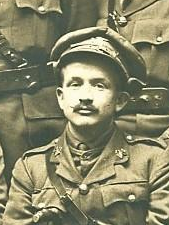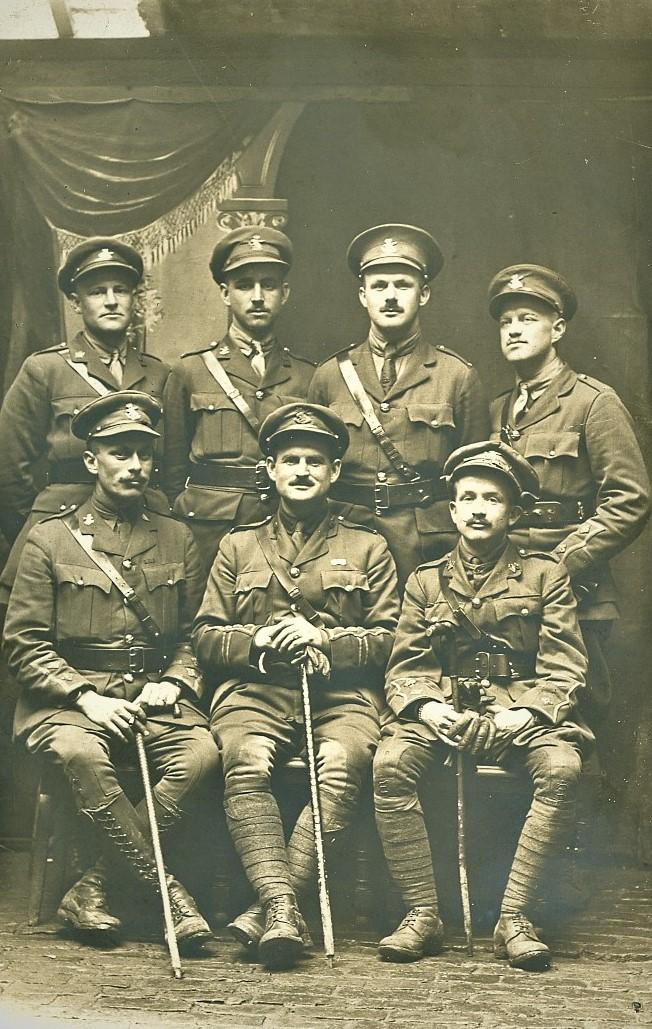
Captain Gregory Clark OC, OBE, MC was born in his family's home at 66 Howland Avenue in Toronto, Ontario. After attending the local grammar school, he went on to Harbord Collegiate and then spent a year at the University of Toronto. During this time he was enamored by a young lady, Helen Scott Murray, who he pursued from a distance for seven long years.
In 1911 he began his journalistic career with the Toronto Star. Throughout his life he was an avid sportsman who enjoying hunting fowl as well as the serene pleasure of fishing. These personal past times were the subjects that he loved to write about the most.
When the European War broke out, Gregory Clark would attest to the 170th Battalion and he would often tell the story on how he obtained his commission. As the story goes, his Sergeant Major recommended him to the commanding officer stating that he couldn't make a soldier out of him, so maybe he should make him an officer.
A mere six months prior to being shipped out, Gregory and Helen would be officially introduced and on the evening prior to the 170th departing for overseas, they were married. Once in England the 170th was absorbed into the 5th Reserve Battalion and regardless of how he obtained his commission, Gregory Clark was taken on strength of the 4th CMR on November 23rd, 1916, as a Lieutenant. Here he was given his nickname "Tom Thumb" due to his diminutive stature and he became a popular Officer.
At the Battle of Vimy Ridge he showed his mettle, for when his Company had lost its commander, Lieutenant Clark took charge. His actions that day earned him the Military Cross, to which the citation reads, "For conspicuous gallantry and devotion to duty. He assumed command of and led his company with great ability, gained his objective, and consolidated the position."
Gregory Clark gained his Captaincy, working as the Adjutant for a time and also became an Acting Major while serving with the unit. He was discharged from the C.E.F. on October 2nd, 1918.
After the war, Gregory returned to his previous employment at the Toronto Star, where he would befriend a fellow veteran and journalist, Ernest Hemmingway. Of Gregory, Hemmingway would say, "He writes the best of everyone on the paper.". Later he would call his friend, one of the finest modern short story writers in the English language.
During the Second World War, Gregory become a war correspondent for the Star, where he covered the Blitzkrieg in France at the start of the war. He went on to cover the events at Dunkirk, Dieppe, and then he followed the Canadian Army through Italy and North West Europe. For his body of work during the war, he was appointed an Officer to the Order of the British Empire.
Although Hemmingway went on to international literary fame, Clark garnered a Leacock Medal for humour in 1965. The Leacock award is an annual literary award presented to the best work of humorous literature in English by a Canadian writer. Gregory won this award for his written work entitled "War Stories".
On July 6th, 1967, he was amongst the first initiated into the newly created Order of Canada, when he was awarded the Service Medal (SM) to that order, which calls for: achievement and merit of a high degree, especially service to Canada or to humanity at large. The citation for his appointment reads, "For the humour which he has brought to his profession as a newspaper writer and radio commentator." The SM was replaced by a degree to the Order, making Gregory an Officer to the Order of Canada.
Gregory Clark lived life to the fullest even through the horrors of war, the heartbreak of losing his eldest son during the Second World War and the loss of his loving wife. Of this he would pen "May Your First Love Be Your Last." He was recognized by his peers and given honours and awards few people ever achieve. Along with those awards came honorary doctorates' from the University of Toronto and the University of Western Ontario. The one he probably got the greatest joy out of was when he was elected to the Canadian Fishing Hall of Fame in 1976.
Gregory Clark, OC, OBE, MC, a Canadian Veteran, sportsman, journalist and humorist passed away February 4th, 1977 and is buried in Toronto's Mount Pleasant Cemetery.

The group image to the right was sent to 4cmr.com by a passing contact early in the site's research days, and it is regretted that a specific credit for the image cannot now be cited. However, it was taken sometime between late 1916 and April 1917.
4th CMR researcher, John Crawford, was able to identify the men in this shot. They are, left to right, (with additional details supplied by 4cmr.com):
Back row:
Lt. Edwin Austin Abbey - originally of the 2nd Pioneer Battalion, lost at Vimy in April 1917,
Lt. James Armstrong Brockleby Chenney - originally of the 33rd Battalion, struck off strength June 1917,
Lt. William George Butson - originally of the 136th Battalion, lost at Vimy in April 1917, and
Lt. Lyell Corson Johnston - originally of the 111th Battalion, also lost at Vimy in April 1917.
Front row:
Capt. William Robert Muirhead - originally of the 66th Battalion, lost at Passchendaele in October 1917,
Major Addison Alexander MacKenzie - wounded at Vimy and struck off strength in April 1917, and
Lt. Gregory Clark - originally of the 170th Battalion (would receive promotion to Captain and gain an MC), also survived the war.
Credit and thanks to George Auer for this detailed biography.
Sincere thanks go to Pete Maxfield for his research, from which it is now known that the "D" Company officers photo was taken in Lillers, France, in either February or March 1917, whilst the regiment was stationed at Burbure.